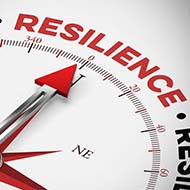
Carol Carpenter leads a workshop on handling difficult experiences.
“What is resilience, and do you feel you have it?”
This is the first of many questions posed to BVNA Congress delegates in a prerecorded workshop on building resilience today (3 October).
The workshop was led by Carol Carpenter, founder and manager of a training and consultancy business, who provided a thought-provoking session exploring what resilience is, and how to build it.
Her take-home message was that resilience is not how quickly you bounce back from distressing situations, but rather, how you reframe situations to continue your usual behaviour in any situation.
Carol began by acknowledging the difficult time that all professions have experienced over the course of the pandemic – noting that resilience, and the need to adapt, has been more important than ever.
She then asked delegates to honestly assess their lives out of the workplace, using a point-based scale from 'almost always' (one point) to 'almost never' (five points). She posed statements such as, 'I get at least 7-8 hours of sleep at least four nights a week', 'I am able to speak openly about my feelings when angry and worried', and 'I eat at least one hot balanced meal a day'.
Going on to explain that the more points you accumulated in the assessment, the more vulnerable you are to behaving negatively and unhelpfully to distressing situations, Carol commented: “How you look after yourself is one aspect of resilience.”
According to Carol, the way you feel in the workplace also plays a significant role in your ability to be resilient, and she stressed the importance of seeking individual purpose and meaning in your job. She asked delegates to consider three questions; what impact do you have at work, why is it important that you do what you do, and what drains and energises you?
“One of the questions that can be easy to focus on is what drains you, I think that what perhaps is the more important question though, is what energises you? What lifts you? What brings you genuine happiness at work? The reason why its really important that we know it and can name it is so that we can protect it, and seek it.”
Carol explained that taking ownership of your own energy at work is important for resilience, rather than waiting for someone else to energise and motivate you.
Delegates were then invited to consider their personal response to distressing situations in the workplace, in order to think about how to change their behaviour in distress events to reflect a more resilient mindset.
Sharing one key way to build resilience, Carol explained: “One thing that can really help is asking ourselves what is controllable, and what is uncontrollable.”
By focusing on what we can control, we build resilience – once we identify what we can control, we can do something about it. Carol shared some ideas for addressing things within your control, including:
• make constrictive changes to a situation
• try to see things from the other person's point of view
• be assertive
• use negotiation skills
• seek practical advice from others.
Carol then shared ideas what to do with the things out of your control, including:
• seek emotional support
• accept the situation
• reframe the situation in terms of importance.
As Carol pointed out, we can manage our emotions by changing our thoughts, and that fundamentally, that is the measure of resilience – reframing our thoughts in order to not change who we are in difficult situations.
Carol left delegates with one last message: “One of the greatest things I am encouraging you to do is to recognise that you are still a brilliant worker, you are still a competent person, you just have probably more work, more volume, maybe less capacity, so perhaps resilience is about forgiving ourselves.”
Image (C) Shutterstock



 The RCVS has announced a new version of its 1CPD mobile app, with enhanced features for veterinary surgeons and veterinary nurses to record their continuing professional development.
The RCVS has announced a new version of its 1CPD mobile app, with enhanced features for veterinary surgeons and veterinary nurses to record their continuing professional development.